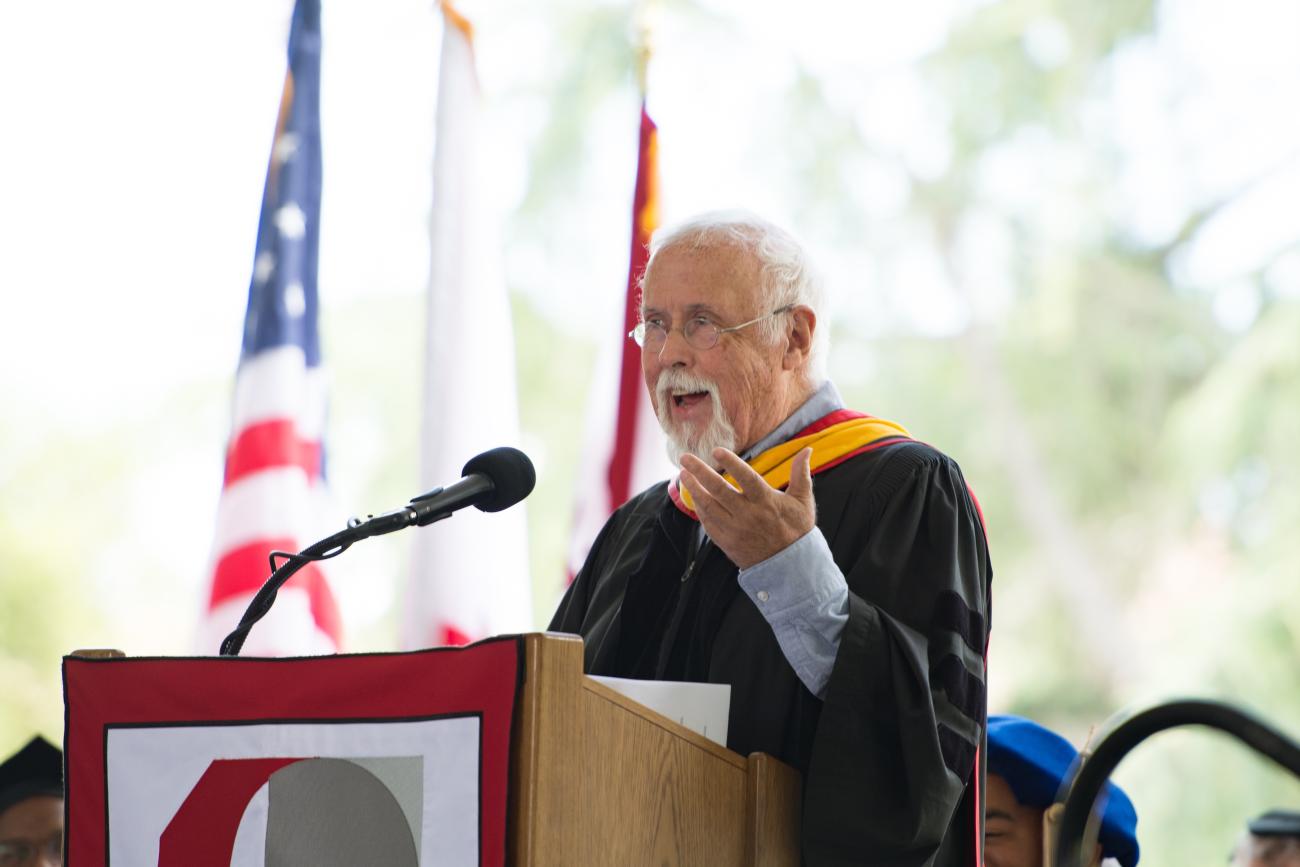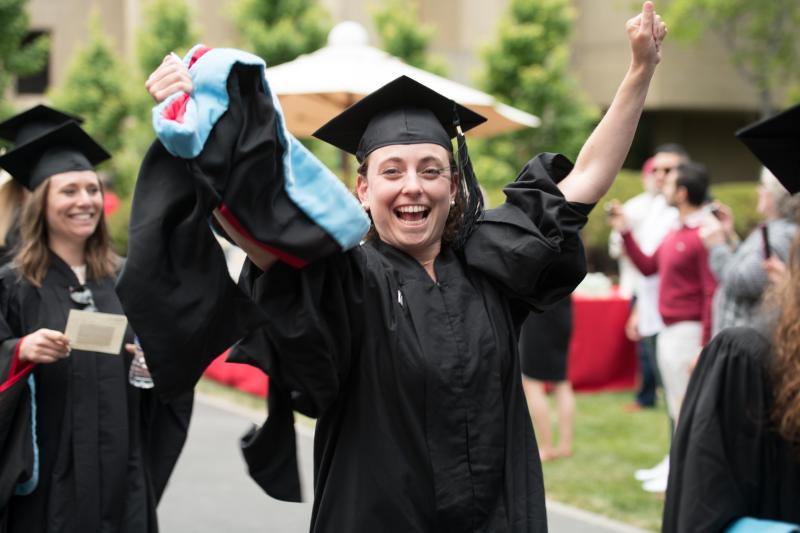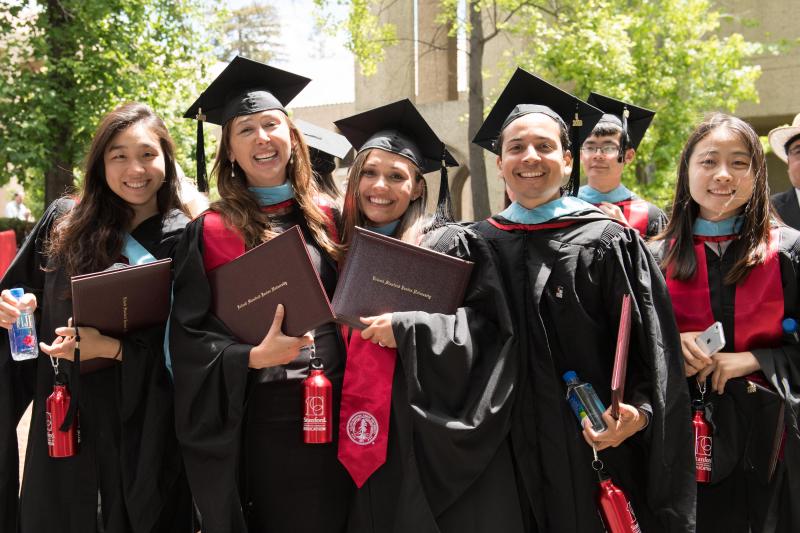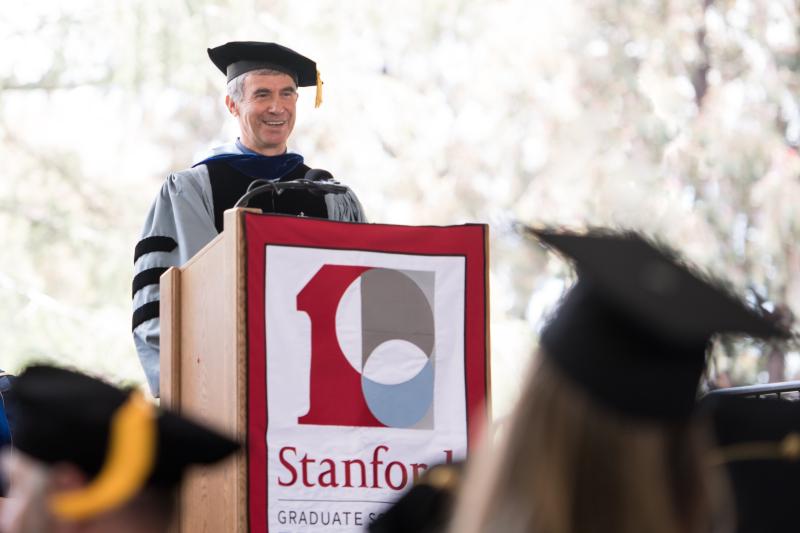
Find the strength in every student, Stanford education graduates told
In an impassioned address to scholars who received degrees from the Stanford Graduate School of Education (GSE) on June 17, Professor Emeritus Ray McDermott delivered a clear message: All students have something to offer, and to miss that is to fail them.
McDermott, an anthropologist whose 50-year career began as a classroom teacher in New York City, joined the GSE faculty in 1989. He said he has seen the American system of education increasingly divide school children into two categories: ones who succeed and ones who don’t.
It’s the teacher’s job, McDermott said, to discover the intelligence and potential of students who score lower on tests or are labeled with learning challenges.
“We have to look more carefully for the hidden strengths of all children,” McDermott said. “Guaranteed, they’re there if you look carefully.”
He cautioned new graduates from imposing categories upon their students or focusing too heavily on achievement gaps.
Instead, urged McDermott, educators should cultivate “curiosity, joy, mystery, wonder, hard work for good reasons, solving problems with others [and] carving out new problems for the next generation of learners to engage.”
McDermott dedicated his remarks to the nearly 2,000 children recently separated from their parents as their families attempted to cross the border into the United States from Mexico.
Centennial graduates
At the start of Sunday’s diploma ceremony, Dean Daniel Schwartz welcomed the Class of 2018 as "centennial graduates," noting the close of a yearlong commemoration of 100 years since the university's department of education was elevated to a school. He said that selecting education as a career was a choice to be part of “a global effort to improve people’s lives through learning.”
Along with this “noble goal,” Schwartz said, comes the need for an oath. Much like doctors take the Hippocratic Oath, he said, GSE graduates could take their own educational oath, committing to a set of values as they move forward in their careers.
Schwartz said he wouldn’t tell graduates what to put in their oaths; he would leave it up to them to decide. But he offered one sentence that his own oath would include: “I will respect that all people have complex mental lives of profound meaning, and I will strive to enrich their abilities to make meaning and achieve a satisfying life.”
The school conferred 25 PhDs and 185 master’s degrees in the 2017-18 academic year. Earlier in the week, the GSE also recognized 31 graduating seniors who completed the undergraduate minor or honors in education.
The 15 honors students successfully completed a supervised research thesis as well as coursework in the school. At a special ceremony on Friday, June 15, they all received honor cords of azure blue – the traditional heraldic color of education – to wear with their academic robes on Commencement weekend.
One master’s graduate to walk in Sunday’s ceremony at Canfield Court was Margaret Katherine Banks, who comes from a long line of educators: Her great-great-grandfather opened a school in Georgia for African American children, and both of her grandparents on her mother’s side were school principals.
Her parents, Kip and Dollie Banks, traveled to Stanford from their home in Upper Marlboro, Maryland, to attend the ceremony.
“It’s just phenomenal to be here,” Dollie Banks said of watching her daughter carry on a family legacy. “It’s really just full circle to see her come back to this.”
Banks plans to go on to teach seventh-grade English at a public charter school in Washington, D.C.
“She’s going back to work in a school system where kids have disadvantages,” her mother said. “It’s gratifying for me to see her take what she’s learned here to that community.”
Banks, who taught middle school children in Oakland as part of the Stanford Teacher Education Program (STEP), reflected on what she took away from her year in the program.
“Kids can do whatever they want to do,” she said, “as long as you help facilitate that process, and you believe in them and they believe in themselves.”
To watch a recording of the ceremony, see the video on the GSE’s Facebook page

Centennial graduates
At the start of Sunday’s diploma ceremony, Dean Daniel Schwartz welcomed the Class of 2018 as "centennial graduates," noting the close of a yearlong commemoration of 100 years since the university's department of education was elevated to a school. He said that selecting education as a career was a choice to be part of “a global effort to improve people’s lives through learning.”
Along with this “noble goal,” Schwartz said, comes the need for an oath. Much like doctors take the Hippocratic Oath, he said, GSE graduates could take their own educational oath, committing to a set of values as they move forward in their careers.
Schwartz said he wouldn’t tell graduates what to put in their oaths; he would leave it up to them to decide. But he offered one sentence that his own oath would include: “I will respect that all people have complex mental lives of profound meaning, and I will strive to enrich their abilities to make meaning and achieve a satisfying life
The school conferred 25 PhDs and 185 master’s degrees in the 2017-18 academic year. Earlier in the week, the GSE also recognized 31 graduating seniors who completed the undergraduate minor or honors in education.
The 15 honors students successfully completed a supervised research thesis as well as coursework in the school. At a special ceremony on Friday, June 15, they all received honor cords of azure blue – the traditional heraldic color of education – to wear with their academic robes on Commencement weekend.
One master’s graduate to walk in Sunday’s ceremony at Canfield Court was Margaret Katherine Banks, who comes from a long line of educators: Her great-great-grandfather opened a school in Georgia for African American children, and both of her grandparents on her mother’s side were school principals.
Her parents, Kip and Dollie Banks, traveled to Stanford from their home in Upper Marlboro, Maryland, to attend the ceremony.
“It’s just phenomenal to be here,” Dollie Banks said of watching her daughter carry on a family legacy. “It’s really just full circle to see her come back to this.”
Banks plans to go on to teach seventh-grade English at a public charter school in Washington, D.C.
“She’s going back to work in a school system where kids have disadvantages,” her mother said. “It’s gratifying for me to see her take what she’s learned here to that community.”
Banks, who taught middle school children in Oakland as part of the Stanford Teacher Education Program (STEP), reflected on what she took away from her year in the program.
“Kids can do whatever they want to do,” she said, “as long as you help facilitate that process, and you believe in them and they believe in themselves.”

A graduate of the Policy, Organization and Leadership Studies (POLS) program celebrates the moment.

Graduates of the Learning, Design and Technology (LDT) master's program with their newly conferred diplomas.

Dean Daniel Schwartz encourages education graduates to write their own oath committing to a set of values as they move forward in their careers. (All photos: Sherry Tesler/Light FX Photography)
To watch a recording of the ceremony, see the video on the GSE’s Facebook page.



